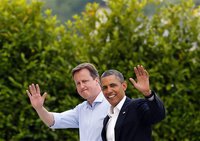Will Group of Eight ignore Russia?
Vladimir Putin risks to find himself isolated at the G8 summit in Lough Erne (Northern Ireland). The remaining seven members of the summit are ready to unite on the issue of Syria and try to put pressure on the Russian leader. In case of failure, a general statement on the topic can be made without Putin's participation in it, as was suggested by British Prime Minister David Cameron.

Putin's talks with his U.S. counterpart Barack Obama within the scope of the summit did not give the desired result either. The parties agreed on many important issues, but the situation in Syria remained the only one, in which they were unable to reach consensus. Reuters journalists called this meeting, "icy." A Bloomberg reporter noted that such a split at global summits was a rare phenomenon.
The Western leaders still harbor a faint hope that the statement on Syria will be accepted, by the Group of Eight, rather than Seven. A source close to the delegates, told Reuters, that the talks over dinner on Monday night were "better than expected". However, no one can predict whether Putin signs the general communiqué.
French President Francois Hollande, however, does not harbor any illusions. Before his meeting with Putin, he said: "It is unlikely that solutions will be found here at the summit." He again criticized Russia for supplying weapons to Damascus. "How can we admit that Russia continues to supply weapons to the regime of Bashar al-Assad, while the opposition has so little weapons?" France Presse said. Hollande also noted that Russia can not ignore the humanitarian situation in Syria, or assume that Assad will remain in power.
A BBC journalist also expressed skepticism: one should not expect any progress on Syria from the summit. At the same time, all eight leaders will undoubtedly try to pretend that the question has been solved.
As for the differences between Russia and the Group of Seven, isolation is extremely unprofitable for Putin. First, this year Russia is hosting the G20 summit (in September in St. Petersburg). Next year, Russia is chairing the G8.
Meanwhile, the U.S. and Russia signed a "new bilateral framework agreement on the reduction of the nuclear threat." This will allow the two countries to cooperate in several areas in the non-proliferation of nuclear materials, White House officials said.
Particularly, it goes about partnership in terms of ensuring protection, control and accounting of nuclear materials. "The new agreement is based on the successful completion of the program from 1992 to reduce the threat of weapons of mass destruction, better known by the names of its authors as the Nunn-Lugar program, which expired on June 17. The new agreement was signed on June 14, ITAR-TASS said.
The statement from the White House said that "joint actions of the U.S. and Russia in the field of nuclear safety would be carried out within the framework of the Multilateral Nuclear Environmental Program in the Russian Federation and on the basis of a bilateral protocol."
"The signing of the new agreement shows that the U.S. and Russia remain committed to nuclear safety and other conscientious goals of non-proliferation," the statement said.
On Monday, June 17, U.S. President Barack Obama said after the talks with Russian President Vladimir Putin that the two countries were going to continue the cooperation that was initiated under the Nunn-Lugar program that provided for the destruction of nuclear, chemical and other types of weapons of mass destruction.
In turn, one of the authors of the Nunn-Lugar program, former Senator Samuel Nunn, said in a separate statement that Moscow and Washington were able to put aside historical differences and show that responsible leadership required joint action to reduce nuclear threats."
Subscribe to Pravda.Ru Telegram channel, Facebook, RSS!


